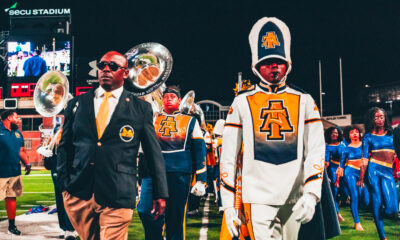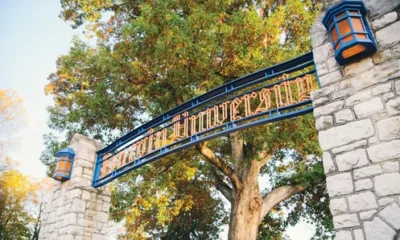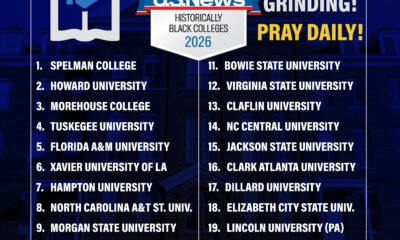Campus
Celebrating Leadership: Presidents of America’s Esteemed HBCUs
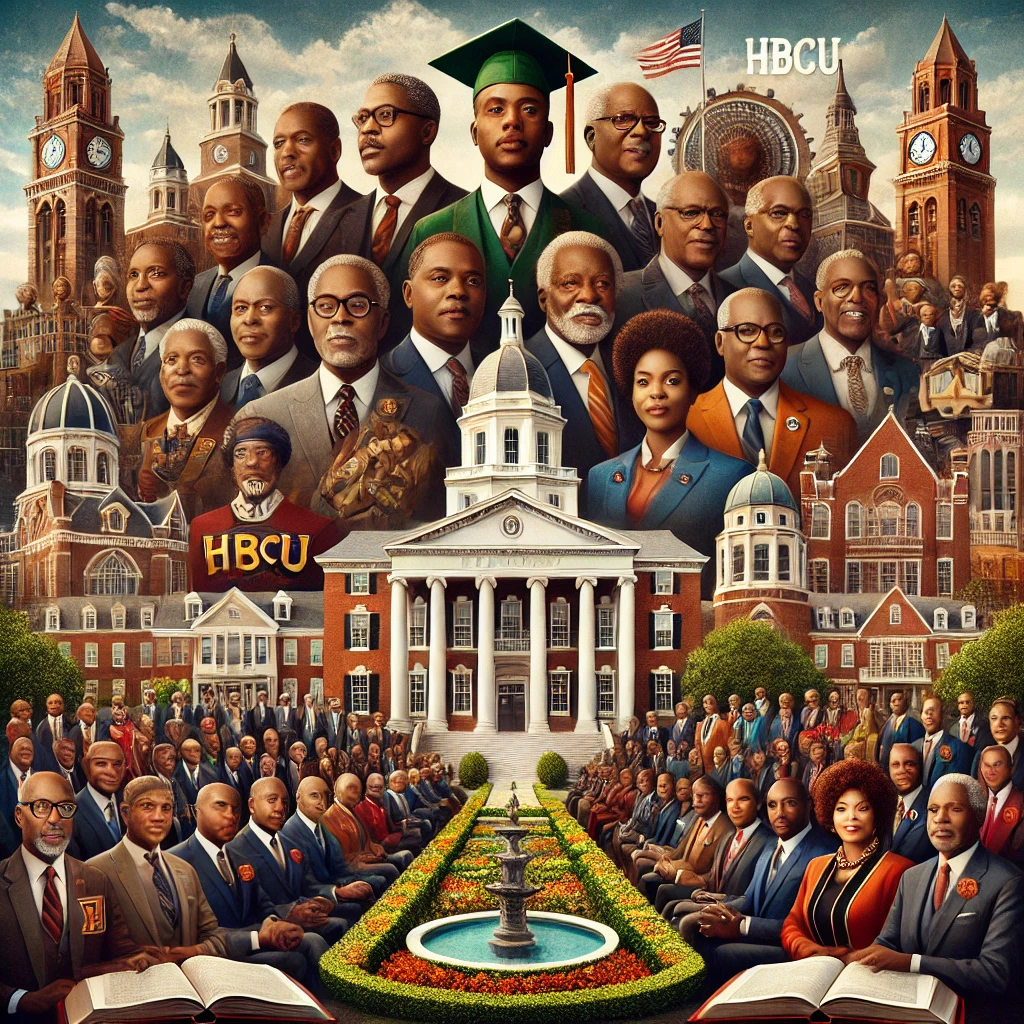
Historically Black Colleges and Universities (HBCUs) have been pillars of higher education, culture, and community for over a century. Their presidents play crucial roles in steering these institutions toward success, fostering innovation, and preserving the rich legacy of HBCUs. Today, we highlight the visionary leaders at the helm of these distinguished schools.
Location: Normal, Alabama
President: Dr. Daniel K. WimsAlabama State University
Location: Montgomery, Alabama
President: Dr. Quinton T. Ross, Jr.
Albany State University
Location: Albany, Georgia
President: Dr. Marion Ross Fedrick
Alcorn State University
Location: Lorman, Mississippi
President: Dr. Felecia M. Nave
Allen University
Location: Columbia, South Carolina
President: Dr. Ernest McNealey
American Baptist College
Location: Nashville, Tennessee
President: Dr. Forrest E. Harris, Sr.
University of Arkansas at Pine Bluff
Location: Pine Bluff, Arkansas
Chancellor: Dr. Laurence B. Alexander
Arkansas Baptist College
Location: Little Rock, Arkansas
President: Dr. Carlos R. Clark
Barber-Scotia College
Location: Concord, North Carolina
Interim President: Dr. David Olah
Benedict College
Location: Columbia, South Carolina
President: Dr. Roslyn Clark Artis
Bennett College
Location: Greensboro, North Carolina
President: Dr. Suzanne Walsh
Bethune-Cookman University
Location: Daytona Beach, Florida
President: Dr. Lawrence M. Drake II
Bishop State Community College
Location: Mobile, Alabama
President: Dr. Olivier Charles
Bluefield State College
Location: Bluefield, West Virginia
President: Dr. Robin C. Capehart
Bowie State University
Location: Bowie, Maryland
President: Dr. Aminta H. Breaux
Carver College
Location: Atlanta, Georgia
President: Dr. Robert Crummie
Central State University
Location: Wilberforce, Ohio
President: Dr. Jack Thomas
Cheyney University of Pennsylvania
Location: Cheyney, Pennsylvania
President: Dr. Aaron A. Walton
Claflin University
Location: Orangeburg, South Carolina
President: Dr. Dwaun J. Warmack
Clark Atlanta University
Location: Atlanta, Georgia
President: Dr. George T. French, Jr.
Clinton College
Location: Rock Hill, South Carolina
President: Dr. Lester A. McCorn
Coahoma Community College
Location: Clarksdale, Mississippi
President: Dr. Valmadge Towner
Coppin State University
Location: Baltimore, Maryland
President: Dr. Anthony L. Jenkins
Delaware State University
Location: Dover, Delaware
President: Dr. Tony Allen
Denmark Technical College
Location: Denmark, South Carolina
President: Dr. Willie L. Todd, Jr.
Dillard University
Location: New Orleans, Louisiana
President: Dr. Rochelle Ford
University of the District of Columbia
Location: Washington, D.C.
President: Dr. Ronald Mason, Jr.
Edward Waters University
Location: Jacksonville, Florida
President: Dr. A. Zachary Faison, Jr.
Elizabeth City State University
Location: Elizabeth City, North Carolina
Chancellor: Dr. Karrie G. Dixon
Fayetteville State University
Location: Fayetteville, North Carolina
Chancellor: Dr. Darrell T. Allison
Fisk University
Location: Nashville, Tennessee
President: Dr. Vann R. Newkirk, Sr.
Florida A&M University
Location: Tallahassee, Florida
President: Dr. Larry Robinson
Florida Memorial University
Location: Miami Gardens, Florida
President: Dr. Jaffus Hardrick
Fort Valley State University
Location: Fort Valley, Georgia
President: Dr. Paul Jones
Gadsden State Community College (Valley Street campus)
Location: Gadsden, Alabama
President: Dr. Kathy L. Murphy
Grambling State University
Location: Grambling, Louisiana
President: Dr. Rick Gallot
Hampton University
Location: Hampton, Virginia
President: Dr. Darrell K. Williams
Harris-Stowe State University
Location: St. Louis, Missouri
President: Dr. LaTonia Collins Smith
Hinds Community College at Utica
Location: Utica, Mississippi
President: Dr. Stephen Vacik
Howard University
Location: Washington, D.C.
President: Dr. Wayne A. I. Frederick
Huston-Tillotson University
Location: Austin, Texas
President: Dr. Melva K. Williams
Interdenominational Theological Center
Location: Atlanta, Georgia
President: Dr. Matthew Wesley Williams
J. F. Drake State Technical College
Location: Huntsville, Alabama
President: Dr. Patricia Sims
Jackson State University
Location: Jackson, Mississippi
President: Dr. Elayne Hayes-Anthony (Interim)
Jarvis Christian University
Location: Hawkins, Texas
President: Dr. Lester C. Newman
Johnson C. Smith University
Location: Charlotte, North Carolina
President: Dr. Clarence D. Armbrister
Kentucky State University
Location: Frankfort, Kentucky
President: Dr. M. Christopher Brown II (Interim)
Knoxville College
Location: Knoxville, Tennessee
President: Dr. Leonard Adams (Interim)
Lane College
Location: Jackson, Tennessee
President: Dr. Logan Hampton
Langston University
Location: Langston, Oklahoma
President: Dr. Kent J. Smith, Jr.
Lawson State Community College
Location: Birmingham, Alabama
President: Dr. Cynthia Anthony
LeMoyne-Owen College
Location: Memphis, Tennessee
President: Dr. Vernell Bennett-Fairs
The Lincoln University
Location: Lincoln University, Pennsylvania
President: Dr. Brenda A. Allen
Lincoln University
Location: Jefferson City, Missouri
President: Dr. John B. Moseley
Livingstone College
Location: Salisbury, North Carolina
President: Dr. Jimmy R. Jenkins, Sr.
University of Maryland Eastern Shore
Location: Princess Anne, Maryland
President: Dr. Heidi M. Anderson
Meharry Medical College
Location: Nashville, Tennessee
President: Dr. James E. K. Hildreth
Miles College
Location: Fairfield, Alabama
President: Dr. Bobbie Knight
Mississippi Valley State University
Location: Itta Bena, Mississippi
President: Dr. Jerryl Briggs
Morehouse College
Location: Atlanta, Georgia
President: Dr. David A. Thomas
Morehouse School of Medicine
Location: Atlanta, Georgia
President: Dr. Valerie Montgomery Rice
Morgan State University
Location: Baltimore, Maryland
President: Dr. David Wilson
Morris Brown College
Location: Atlanta, Georgia
President: Dr. Kevin James
Morris College
Location: Sumter, South Carolina
President: Dr. Leroy Staggers
Norfolk State University
Location: Norfolk, Virginia
President: Dr. Javaune Adams-Gaston
North Carolina A&T State University
Location: Greensboro, North Carolina
Chancellor: Dr. Harold L. Martin, Sr.
North Carolina Central University
Location: Durham, North Carolina
Chancellor: Dr. Johnson O. Akinleye
Oakwood University
Location: Huntsville, Alabama
President: Dr. Leslie N. Pollard
Paine College
Location: Augusta, Georgia
President: Dr. Cheryl Evans Jones
Paul Quinn College
Location: Dallas, Texas
President: Dr. Michael J. Sorrell
Philander Smith College
Location: Little Rock, Arkansas
President: Dr. Roderick L. Smothers, Sr.
Prairie View A&M University
Location: Prairie View, Texas
President: Dr. Ruth J. Simmons (Interim)
Rust College
Location: Holly Springs, Mississippi
President: Dr. Ivy R. Taylor
Savannah State University
Location: Savannah, Georgia
President: Dr. Kimberly Ballard-Washington
Selma University
Location: Selma, Alabama
President: Dr. Stanford E. Angion
Shaw University
Location: Raleigh, North Carolina
President: Dr. Paulette Dillard
Shelton State Community College (C.A. Fredd Campus)
Location: Tuscaloosa, Alabama
President: Dr. Chris Cox
Shorter College
Location: North Little Rock, Arkansas
President: Dr. O. Jerome Green
Simmons College of Kentucky
Location: Louisville, Kentucky
President: Dr. Kevin W. Cosby
South Carolina State University
Location: Orangeburg, South Carolina
President: Dr. Alexander Conyers
Southern University at New Orleans
Location: New Orleans, Louisiana
Chancellor: Dr. James H. Ammons, Jr.
Southern University at Shreveport
Location: Shreveport, Louisiana
Chancellor: Dr. Rodney Ellis
Southern University and A&M College
Location: Baton Rouge, Louisiana
President-Chancellor: Dr. Dennis J. Shields
Southwestern Christian College
Location: Terrell, Texas
President: Dr. Ervin D. Seamster, Jr.
Spelman College
Location: Atlanta, Georgia
President: Dr. Helene Gayle
St. Augustine’s University
Location: Raleigh, North Carolina
President: Dr. Christine Johnson McPhail
St. Philip’s College
Location: San Antonio, Texas
President: Dr. Adena Williams Loston
Stillman College
Location: Tuscaloosa, Alabama
President: Dr. Cynthia Warrick
Talladega College
Location: Talladega, Alabama
President: Dr. Gregory J. Vincent
Tennessee State University
Location: Nashville, Tennessee
President: Dr. Glenda Glover
Texas College
Location: Tyler, Texas
President: Dr. Dwight J. Fennell
Texas Southern University
Location: Houston, Texas
President: Dr. Lesia L. Crumpton-Young
Tougaloo College
Location: Tougaloo, Mississippi
President: Dr. Carmen J. Walters
H. Councill Trenholm State Community College
Location: Montgomery, Alabama
President: Dr. Kemba Chambers
Tuskegee University
Location: Tuskegee, Alabama
President: Dr. Charlotte P. Morris
University of the Virgin Islands
Location: St. Thomas and St. Croix, U.S. Virgin Islands
President: Dr. David Hall
Virginia State University
Location: Petersburg, Virginia
President: Dr. Makola M. Abdullah
Virginia Union University
Location: Richmond, Virginia
President: Dr. Hakim J. Lucas
Virginia University of Lynchburg
Location: Lynchburg, Virginia
President: Dr. Kathy Franklin
Voorhees University
Location: Denmark, South Carolina
President: Dr. Ronnie Hopkins
West Virginia State University
Location: Institute, West Virginia
President: Dr. Ericke S. Cage
Wilberforce University
Location: Wilberforce, Ohio
President: Dr. Elfred Anthony Pinkard
Wiley University
Location: Marshall, Texas
President: Dr. Herman J. Felton, Jr.
Winston-Salem State University
Location: Winston-Salem, North Carolina
Chancellor: Dr. Elwood L. Robinson
Xavier University of Louisiana
Location: New Orleans, Louisiana
President: Dr. Reynold Verret
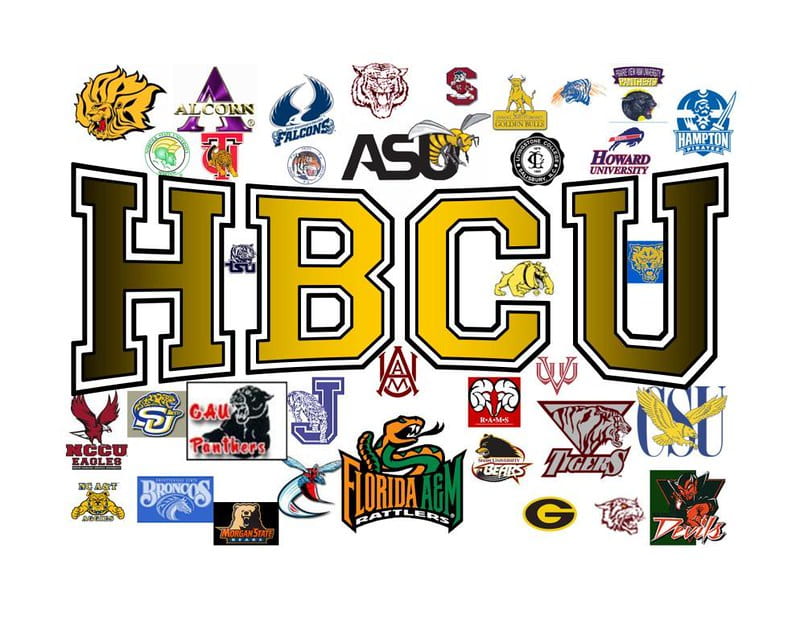
Fun Facts About HBCUs You Might Not Know
The legacy of HBCUs is rich with history, culture, and achievements. Here are some cool facts about a few of these remarkable institutions:
Howard University
- Did You Know? Howard University is often referred to as “The Mecca” because of its pivotal role in African American culture and history. It has produced more African American Ph.D. holders than any other university in the world.
Spelman College
- Did You Know? Spelman College is the oldest historically Black college for women in America. It was originally founded as the Atlanta Baptist Female Seminary in 1881 and later became Spelman College in 1924.
Tuskegee University
- Did You Know? Tuskegee University is home to the famous Tuskegee Airmen, the first African American military aviators in the U.S. Armed Forces. The university also has a National Historic Site, the Tuskegee Institute National Historic Site, on its campus.
Morehouse College
- Did You Know? Morehouse College is the only HBCU dedicated exclusively to the education of African American men. Among its notable alumni are Dr. Martin Luther King Jr., filmmaker Spike Lee, and actor Samuel L. Jackson.
Florida A&M University (FAMU)
- Did You Know? FAMU has one of the top-ranked public pharmacy schools in the nation. The university’s Marching “100” band is also world-renowned and has performed in venues like the Super Bowl and the Grammy Awards.
Xavier University of Louisiana
- Did You Know? Xavier University of Louisiana produces more African American students who go on to complete medical school than any other college in the U.S.
Lincoln University (PA)
- Did You Know? Lincoln University is the first degree-granting HBCU in the United States, founded in 1854. Notable alumni include Langston Hughes, Thurgood Marshall, and Kwame Nkrumah, the first president of Ghana.
North Carolina A&T State University
- Did You Know? North Carolina A&T State University is the largest HBCU in the United States by enrollment. It is also known for its powerful engineering programs and is one of the top producers of African American engineers in the country.
Hampton University
- Did You Know? Hampton University owns the largest free-standing proton therapy cancer treatment center in the world, the Hampton University Proton Therapy Institute.
Bethune-Cookman University
- Did You Know? Founded by Dr. Mary McLeod Bethune with just $1.50 and a mission to educate African American girls, Bethune-Cookman University has grown into one of the most respected HBCUs in the nation.
Campus
The Sound of the Yard: The Legacy of HBCU Marching Bands
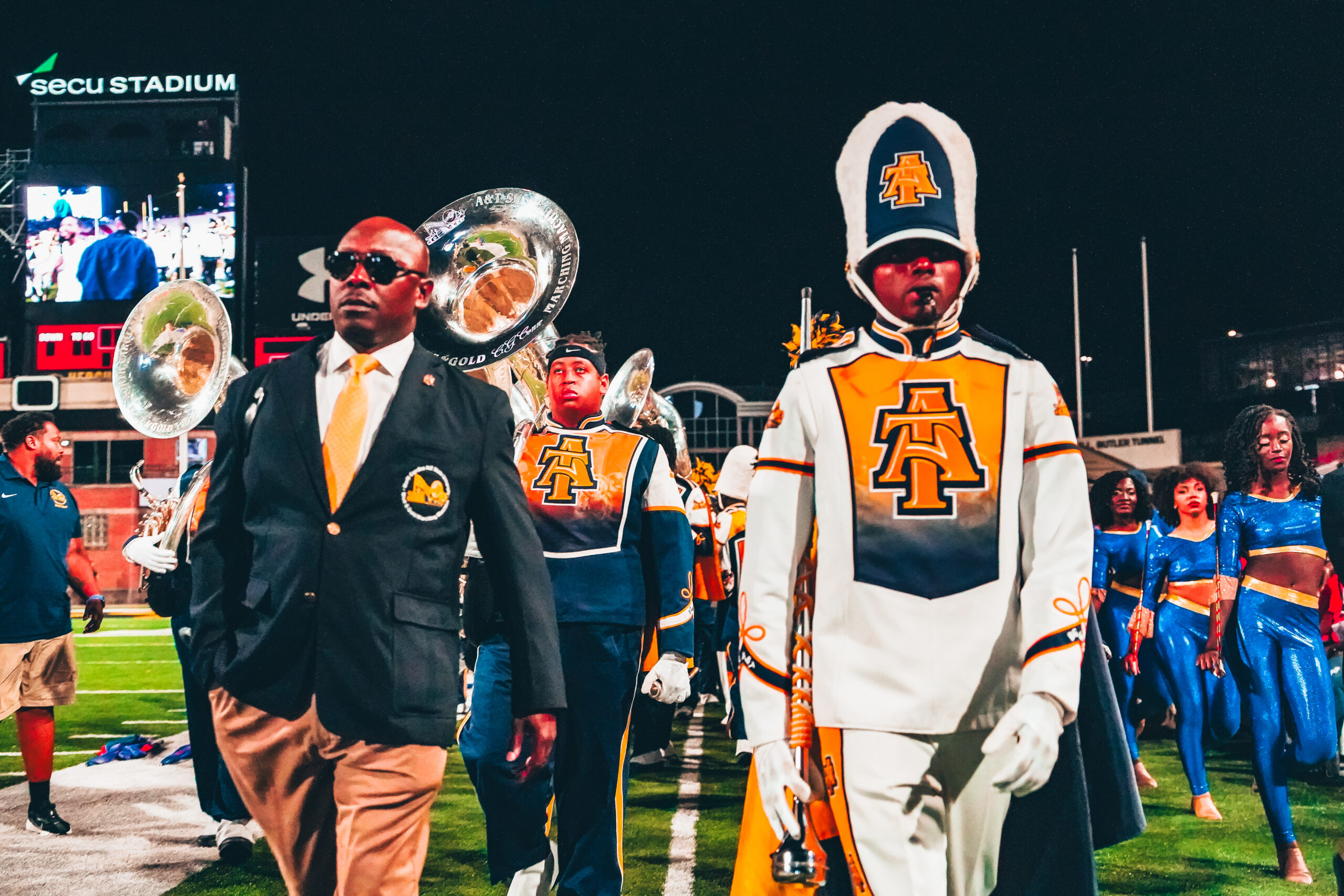
When the drums start rolling and the brass section blasts the first note, something magical happens — the crowd rises, feet start stomping, and the stadium becomes a stage. That’s the power of HBCU marching bands — the lifeblood of the yard and the heartbeat of Black college pride.
Across the country, these bands have redefined what it means to perform. It’s not just about music — it’s about precision, power, and pride. Each halftime show tells a story of community, culture, and creative excellence that stretches from the campus yard to the world stage.
Legendary programs like The Human Jukebox of Southern University and The Sonic Boom of the South from Jackson State University have set the tone for decades, known for their dynamic choreography and iconic sound. The Marching 100 of Florida A&M University revolutionized marching band performance with intricate formations and high-energy brass arrangements, influencing college and high school bands globally.
But they’re not alone in this legacy.
-
The Ocean of Soul (Texas Southern University) brings unmatched groove and funk to every performance.
-
The Aristocrat of Bands (Tennessee State University) made history as the first HBCU band to win a GRAMMY Award in 2023 for “The Urban Hymnal.”
-
The Blue and Gold Marching Machine (North Carolina A&T State University) blends traditional sound with modern flair, leading parades like the Macy’s Thanksgiving Day Parade.
-
The Marching Storm (Prairie View A&M University) commands attention with style and showmanship, competing toe-to-toe with any major college program.
-
The Spartan Legion (Norfolk State University) continues to uphold the proud musical traditions of the MEAC and SWAC.
-
The Marching Maroon & White (Alabama A&M University) exemplifies disciplined performance and HBCU pride.
Additional extraordinary programs include:
-
The Trojan Explosion (Virginia State University) — high-energy performances with innovative formations.
-
The Red Sea of Sound (Winston-Salem State University) — signature style and powerful brass arrangements.
-
The Symphony of Soul (Bowie State University) — blending soulful melodies with marching precision.
-
The Marching Force (Hampton University) — a legacy of excellence on every field.
-
Showtime Band (Howard University) — dynamic, creative, and nationally recognized performances.
-
Sound Machine (North Carolina Central University) — a staple of modern HBCU band excellence.
From local parades to the Honda Battle of the Bands, HBCU bands bring an experience that transcends entertainment — it’s cultural storytelling through sound.
Their influence has reached far beyond the yard — from collaborations with Beyoncé’s Homecoming to halftime shows at the Super Bowl. These bands symbolize the discipline, excellence, and creativity that define HBCU culture.
For the students who march, every note is a tribute — to their ancestors, their schools, and the legacy they represent. The sound of the yard will always be more than music — it’s the soul of the HBCU experience.
#HBCUOriginal | #TheSoundOfTheYard | #BlackCollegeCulture | #HBCUBands
📺 Visit HBCUOriginal.com | 🎥 Watch more at YouTube.com/@THEHBCUORIGINAL
Campus
The Capitol Battle of the Bands 2025
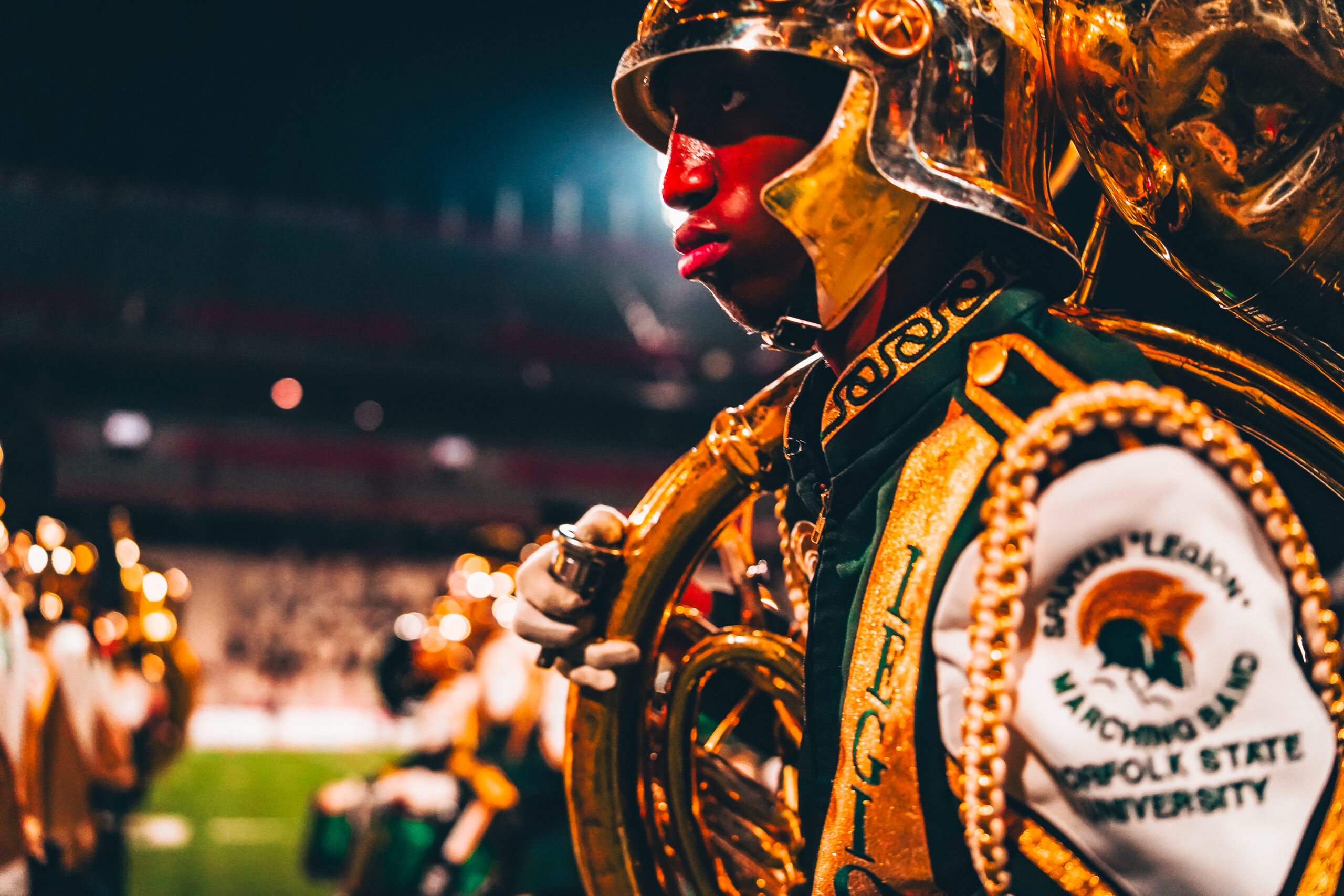
Hosted by High Stepping Nationals | SECU Stadium – College Park, Maryland
The air in College Park was thick with rhythm, pride, and school spirit as the Capitol Battle of the Bands took over SECU Stadium. Hosted by High Stepping Nationals, this electrifying event brought together some of the most dynamic marching bands, drumlines, and spirit teams in the country — all under one roof, all for one culture.
From the first booming drumbeat to the final blast of brass, the stands shook with energy as crowds from across the East Coast gathered to witness HBCU greatness and local high school talent take center stage.
🎶 The Lineup
The field was blessed by the presence of elite bands including:
-
Norfolk State University Spartan Legion
-
North Carolina A&T Blue & Gold Marching Machine
-
Virginia State University Trojan Explosion
-
Winston-Salem State University Red Sea of Sound
-
Bowie State University Symphony of Soul
-
Hampton University Marching Force
-
Howard University Showtime Band
-
North Carolina Central University Sound Machine
-
PGCPS High School Pride, representing the best young talent across Prince George’s County
Each band brought their own flavor — from show-stopping arrangements and precision drills to heart-thumping drumline battles that left the crowd roaring.
💃🏽 The Spirit of the South
The cheerleaders, flag teams, and dance squads elevated the night with unmatched grace and attitude. From the Hampton Force dancers to the WSSU cheerleaders strutting into the stadium, every move reminded the audience that style, pride, and culture are at the heart of every performance.
🥁 The Drumline Faceoff
When Virginia State’s Trojan Explosion Drumline met Norfolk State’s Spartan Legion Drumline on the field, the night hit another level. Beats collided, sticks flew, and the energy was pure adrenaline. This was not just a battle — it was a statement.
🌟 PGCPS Pride
Representing Maryland’s future stars, the PGCPS High School Pride Ensemble showcased young musicians who are already marching toward excellence. Their performance was a reminder that the HBCU legacy is alive and growing strong in local schools.
🎥 Watch the Full Experience
Missed the live show? Don’t worry — you can relive every moment, every note, every move.
📺 Full Highlights: Watch now on YouTube – HBCU Original
🎬 YouTube Channel: @THEHBCUORIGINAL
Campus
Tomorrow’s Leaders, Today’s Tech: How HBCUs are Shaping the Future

HBCUs Tech Forward: Innovating Tradition for 2025 and Beyond
Historically Black Colleges and Universities (HBCUs) are steeped in rich history and enduring traditions, but make no mistake: these institutions are anything but stuck in the past. Today, HBCUs are vigorously embracing the future, strategically integrating cutting-edge technology into every facet of academic life, research, and campus operations. Far from compromising their unique cultural heritage, they are demonstrating how to blend tradition with innovation seamlessly, preparing students to lead in an increasingly digital world.
From virtual learning platforms that expand access and flexibility to advanced STEM programs pushing the boundaries of discovery, HBCUs are re-envisioning what modern education looks like. They are not just adopting technology; they are actively shaping its future and ensuring their students are at the forefront.
Leading the Charge: HBCUs Embracing Technology
Several HBCUs are standing out for their commitment to technological advancement:
- North Carolina A&T State University: A national leader in engineering and STEM fields, NC A&T is known for its robust research programs, including those in cybersecurity, advanced manufacturing, and renewable energy. Their students are actively involved in cutting-edge projects, often in partnership with industry leaders, positioning them for high-demand careers.
- Spelman College: While rooted in liberal arts, Spelman has made significant strides in STEM, offering strong programs in computer science, data science, and health sciences. They are fostering an environment where Black women excel in tech, encouraging innovation through initiatives like their “Spelman College Center of Excellence for Minority Women in STEM.”
- Howard University: As a top-tier research institution, Howard is continually expanding its technological footprint. From its pioneering work in artificial intelligence and machine learning to robust digital media programs, Howard prepares students to be innovators and ethical leaders in the tech space. They are also leveraging technology to enhance remote learning capabilities and collaborative research across departments.
- Florida A&M University (FAMU): FAMU is making significant investments in its STEM infrastructure, with a strong focus on programs in information technology, environmental engineering, and pharmaceutical sciences. Their commitment to technological literacy ensures that graduates are well-equipped for diverse professional paths, often integrating practical, hands-on experience with theoretical knowledge.
These institutions, and many others, are equipping students with the critical skills needed for tomorrow’s workforce – from coding and data analytics to digital storytelling and biotechnological innovation. At the same time, HBCUs meticulously maintain their vibrant cultural traditions, ensuring students experience the best of both worlds: a deep connection to their heritage alongside preparation for a technologically advanced future.
Conclusion:
Innovation and tradition are not opposing forces at HBCUs; they are complementary strengths. By wholeheartedly embracing technology while profoundly honoring their rich history and cultural identity, these institutions are preparing students not just to adapt to a rapidly changing world, but to actively shape it. HBCUs are setting a powerful standard for what modern, culturally responsive, and future-focused education truly means.
Campus
Forged in Faith, Renamed for Freedom: The Lincoln University Story
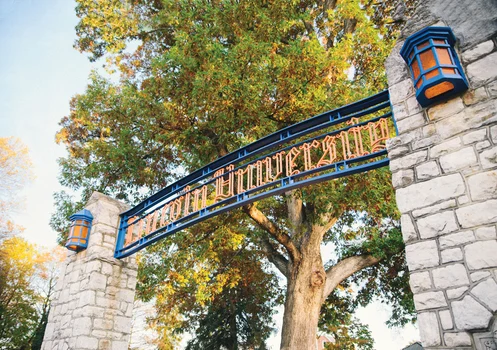
The Founding Vision: The Ashmun Institute (1854)
In the decade before the Civil War, opportunities for the higher education of African Americans were almost nonexistent. In this climate, a white Presbyterian minister named Reverend John Miller Dickey and his wife, Sarah Emlen Cresson, undertook a revolutionary project in Chester County, Pennsylvania. On April 29, 1854, they secured a charter from the Commonwealth of Pennsylvania to establish The Ashmun Institute.
The institute was named in honor of Jehudi Ashmun, a religious leader and social reformer associated with the American Colonization Society, a movement that encouraged the migration of free African Americans to Liberia. The initial mission of the institute was to provide a classical, scientific, and theological education for young men of African descent, with an early focus on training them to become missionaries and leaders.
The founding of the Ashmun Institute was an unprecedented step. It was the first institution in world history dedicated to providing a university-level liberal arts education for Black men, empowering them with the same rigorous academic training available to white students at the time.
A New Era and a New Name: Lincoln University (1866)
The end of the Civil War in 1865 and the subsequent abolition of slavery marked a profound turning point for the nation and for the Ashmun Institute. The country was grappling with the challenges of Reconstruction and the new reality of millions of formerly enslaved people seeking education and opportunity.
In 1866, just one year after the assassination of President Abraham Lincoln, the institute’s board of trustees voted to rename the institution in his honor. This change to Lincoln University was a tribute to the late president, revered for his role in the emancipation of enslaved people.
The new name also signaled a broadening of the university’s mission. While the foundational goal of providing excellent education remained, the focus expanded beyond missionary work to preparing African American men for leadership roles within the United States. As Lincoln University, it dedicated itself to educating leaders, professionals, and activists who would go on to challenge injustice and shape a new future.
From its pioneering start as the Ashmun Institute to its transformation into Lincoln University, the institution has remained a pillar of academic excellence and a crucial incubator of Black leadership, boasting celebrated alumni like U.S. Supreme Court Justice Thurgood Marshall and poet Langston Hughes.
Campus
“Navigating Identity at HBCUs: Where Culture Meets Academic Excellence”

Navigating Identity: The Intersection of Culture and Academia at HBCUs
College is often described as a time of learning and growth, but for many students, it is much more than academics—it is a journey of self-discovery. At Historically Black Colleges and Universities (HBCUs), this journey is uniquely enriched by culture, tradition, and community. HBCUs are not just institutions of higher learning; they are environments that nurture identity, heritage, and leadership while preparing students to thrive academically and socially.
Embracing Culture and Heritage
One of the most defining aspects of HBCU life is the deep connection to Black culture and history. Campus traditions, homecomings, step shows, and cultural festivals are not only celebrations—they are opportunities for students to explore and express their identities. For example, homecoming events at schools like Howard University or Florida A&M University bring together generations of students and alumni to celebrate achievements, honor traditions, and cultivate pride in their shared heritage.
Cultural events provide students with spaces to reflect on their roots, understand their place in history, and develop a sense of belonging. This connection to culture fosters confidence and resilience, empowering students to navigate the challenges of college life while staying grounded in who they are.
The Intersection of Identity and Academia
HBCUs provide a unique environment where culture and academics intersect seamlessly. Students are encouraged to excel in rigorous programs while embracing the aspects of their identity that make them unique. Programs in STEM, business, arts, and social sciences often incorporate culturally relevant perspectives, ensuring that education at HBCUs is both challenging and empowering.
This environment encourages students to develop leadership skills, critical thinking, and self-awareness. The support of faculty, mentors, and peers helps students confront challenges, celebrate accomplishments, and prepare for life after graduation. In essence, HBCUs equip students with the tools to excel academically while maintaining pride in their heritage.
Building Lifelong Networks
Another significant aspect of HBCU life is the sense of community and the networks students build. Friendships formed in classrooms, dorms, and student organizations often become lifelong connections. Alumni networks remain strong, providing mentorship, career opportunities, and guidance long after graduation. These networks reinforce the values of collaboration, mutual support, and shared success—foundational elements in the development of personal and professional identity.
Conclusion: Identity, Purpose, and Excellence
HBCUs offer far more than education—they provide a foundation for identity, purpose, and leadership. By balancing cultural pride with academic excellence, students graduate not only with degrees but with a deep understanding of who they are and the impact they can make on the world. For students navigating the intersection of culture and academia, HBCUs are a space where they can thrive, celebrate their heritage, and prepare to lead with confidence and pride.
-

 HBCU ORIGINAL2 months ago
HBCU ORIGINAL2 months agoDelaware State Shows Fight in Road Matchup vs Saint Joseph’s
-

 Sports4 weeks ago
Sports4 weeks agoCoppin State Hosts No. 2 South Carolina in Baltimore
-

 HBCU ORIGINAL2 weeks ago
HBCU ORIGINAL2 weeks ago🦁🐺 HBCU Original — Lincoln & Cheyney Deliver Big Performances at Widener Schuylkill Showdown
-

 HBCU ORIGINAL2 weeks ago
HBCU ORIGINAL2 weeks agoTuskegee Coach Benjy Taylor Escorted Off Court in Handcuffs After Postgame Incident




